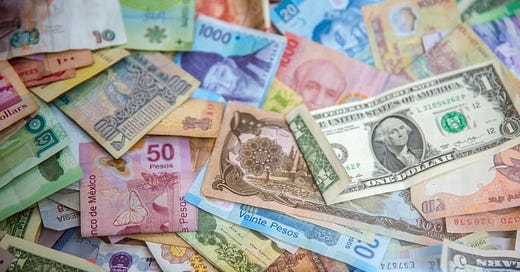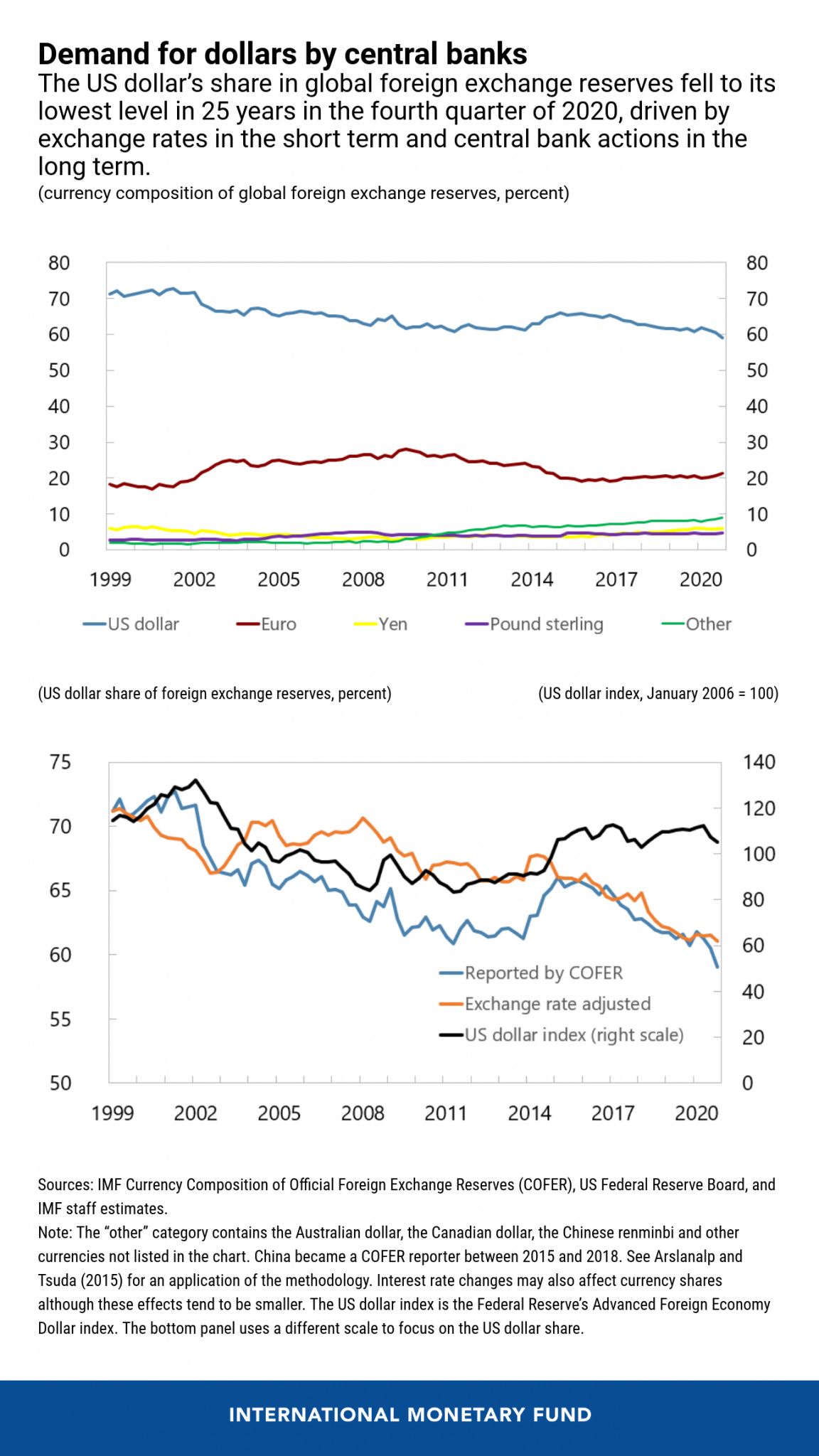Emerging Markets Daily - May 9
US Dollar Loses Shine as Reserve Currency, Brazil Town Beating Covid, Israel and S. Korea in Trade Pact, The Asian Exception in EM Woes, China's New Space Satellite Co
The Top 5 Emerging Markets Stories from Global Media - May 9
US Dollar Loses Shine as Reserve Currency for Emerging Economies
Nikkei Asia
“The share of U.S. dollar-denominated assets in the world's foreign reserves sank for the fifth straight year in 2020 to 59%, its lowest level in a quarter century, as emerging economies like China and Russia diversify holdings amid concerns over the greenback's prospects.”
“As a trusted and liquid asset, U.S. government bonds have long been a go-to option in foreign reserves, which governments and central banks maintain as a backup fund of sorts in case of a monetary emergency.”
“But data from the International Monetary Fund suggests the dollar may be starting to lose its draw as a reserve currency. As the coronavirus exacerbates the so-called twin deficit in the U.S., casting doubt over the dollar's long-term value, authorities around the world are starting to place more weight on assets in alternative currencies as well as nonmonetary options like gold.” Yuta Saito, Takero Minami, and Misa Hama report
Chart of the Day - from IMF Blog
Brazil Town Beating Covid With Simple Formula: Vaccinate Every Adult
Wall Street Journal
“This town of 45,000 people in southeastern Brazil has been at the center of a unique experiment for the past three months: vaccinate nearly every adult against Covid-19 and see what happens.”
“In recent weeks, after most of the adults here got their second dose, Covid-19 cases and deaths plunged and life has started to return to normal as the pandemic continues to rage across Brazil.”
“In the heart of Serrana, children squealed with laughter as they chased each other across the main square, while groups of friends—many unmasked —stopped to chat and bask in the afternoon sun.”
“‘We feel free,’ said Homero Cavalheri, 68 years old, a retired architect who said he no longer spends his afternoons cooped up at home. He was strolling with his wife, Irene, and their 1-year-old grandson. ‘Everything is new to him,’ said Mr. Cavalheri, clutching the boy. ‘He keeps pointing at all the trees and the birds.’”
“The experiment in Serrana, a town in Brazil’s sugar-cane-producing savanna, provides hope for countries around the world still battling with coronavirus outbreaks that mass vaccination works. It also offers new evidence of the efficacy of Sinovac’s Covid-19 vaccine, which is being rolled out in dozens of developing nations from Egypt to the Philippines.” Samantha Pearson and Luciana Magalhaes report.
Israel and South Korea to Sign Free Trade Pact
Reuters
“Israel will sign a free trade agreement with South Korea this week, marking the first such arrangement with an Asian market, Israel's economy ministry said on Sunday.”
“The deal is meant to bolster bilateral trade by cutting out customs duties and offering safety nets on investments. Bilateral trade reached about $2.4 billion in 2020, about two thirds of it goods and services imported into Israel, the ministry said.”
“…More than 95% of Israeli exports to South Korea will be customs-free, the ministry said. Israel is working on similar deals with China, Vietnam and India, it added.” Reuters reports
Asia Is Exception as Emerging Markets Start to Look Fragile
Bloomberg
“In the pandemic’s second year, some familiar worries -- about inflation, capital flight or public debt -- are starting to surface across the developing world. Except in one corner.”
“In Asia, policy makers aren’t too preoccupied with these classic emerging-market problems. Their economies look increasingly like they’ve emerged.”
“…That’s largely down to lessons learned from the traumas of the past three decades –- from the late-1990s regional meltdown to the global crash of 2008 and the so-called “taper tantrum” of 2013 -- and the defenses put in place as a result.”
“‘Asian countries have used past crises to learn and build resilience,’ said Sonal Varma, an economist at Nomura Holdings Inc. in Singapore.” Michelle Jamrisko reports
China’s Got a New but Little Known State-Owned Satellite Enterprise
South China Morning Post
“In late April, a day before SpaceX launched its 10th batch of satellites this year, Chinese Vice-Premier Han Zheng attended a ceremony in Xiongan, a megacity that is about a two hours’ drive south of Beijing, celebrating the creation of a new state-owned enterprise set up to operate China’s answer to Starlink, run by Elon Musk’s SpaceX.”
“Known as China Satellite Network Group, the young company is tasked with launching low Earth orbit (LEO) satellites into space, beaming internet services to anywhere on the planet. It reports to the Assets Supervision and Administration Commission, which controls the Chinese government’s stakes in state-owned companies.”
“Other details about the new firm remain shrouded in mystery.”
“…The company is also China’s first state-owned enterprise at the state level to set up its head office in Xiongan, a formerly sleepy rural region hand-picked by President Xi Jinping four years ago to be rebuilt into a futuristic smart city.” Tracy Qu reports
Plus…
We can relax about the Chinese rocket debris falling back to Earth…
Deutsche Welle
“Debris from a Chinese rocket fell back to Earth on Sunday, disintegrating over the Indian Ocean, according to Chinese state media. The reports cited the China Manned Space Engineering Office as saying that the point of impact was southwest of India and Sri Lanka.”
"‘After monitoring and analysis, at 10:24 (0224 GMT) on May 9, 2021, the last-stage wreckage of the Long March 5B Yao-2 launch vehicle has re-entered the atmosphere,’ it said in a statement.”
“The fragments are from the Long March-5b rocket that was used to launch the first module of China's new space station last month.”
“At 18 tons it is one of the largest items in decades to have undergone an uncontrolled reentry into the atmosphere. There had been fervent speculation about where it would land, but given that Earth is nearly 70% water the chances of it hitting an inhabited area were very small.”
“Last year, debris from a rocket fell on villages in Ivory Coast but there were no injuries or deaths.”
To receive a daily round-up of the stories shaping the emerging world, occasional thought leader interviews, and the weekly Emerging World column by Afshin Molavi…
You can always reach us with thoughts, ideas, tips at eworldairmail@gmail.com





